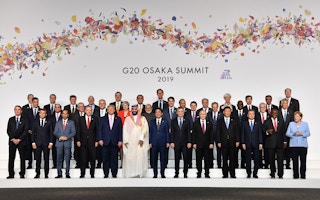As G20 countries meet for the group’s annual summit in Osaka, the world’s leading economies are failing to phase out wasteful fossil fuel subsidies and host Japan is bowing to US pressure to remove references to emissions in the draft communiqué.
Ten years ago the G20 pledged to “phase out and rationalise” fossil fuel subsidies yet the cost increased from US$75 billion in 2007 to US$147 billion in 2016, the last year that data is available for the entire group.
“Since 2009, the G20 is limited to copying and pasting the same statement every year in its annual document, stating that fossil fuel subsidies are inefficient and hinder the energy transition. But that’s not enough,” said Enrique Maurtua Konstantinidis, senior advisor on climate policy for the Environment and Natural Resources Foundation (FARN).
Size and importance
The G20 economies represent more than 80 per cent of global GDP and three quarters of global trade. The G20 is also responsible for 79 per cent of global emissions so it has a major role in fulfilling the goals of the Paris Agreement.
“
Ten years have passed since the group’s commitment and it hasn’t been possible to advance a definition of subsidies or a specific date to remove them.
Ipek Gencsu, subsidies specialist, Overseas Development Institute
However, current G20 commitments are insufficient to prevent a global average temperature increase of more than 2C compared to pre-industrial levels.
G20 countries still generate most of their energy from fossil fuels. From 2013 to 2015, at the group level, they spent US$91.4 billion per year on coal, oil and gas projects. A new report by the Overseas Development Institute finds that they provide US$63.9 billion per year to the production and consumption of coal.
“Ten years have passed since the group’s commitment and it hasn’t been possible to advance a definition of subsidies or a specific date to remove them,” said Ipek Gencsu, a specialist in subsidies at the Overseas Development Institute (ODI).
The group’s 2009 commitment was quickly replicated by other organisations. The G7, which includes members of the G20, promised to remove subsidies by 2025. Goal 12 of the Sustainable Development Goals (SDGs) commits to “rationalising inefficient subsidies”.
Environmental and social groups are pressuring G20 host Japan to set a specific date for the group to eliminate subsidies that is reflected in the final leaders’ statement. Expectations that this will happen are low. Indeed, the current draft by Japan does not call for the reduction of emissions in a departure from recent years.
The role of subsidies
G20 countries grant subsidies through various mechanisms such as tax exemptions, financial incentives, reimbursements and bonuses. They are directed at the production of hydrocarbons and their consumption, decreasing the prices of fuel for consumers.
“They also vary with the price of oil. When it is low, subsidies also go down since consumers are not so concerned about prices. But the opposite happens with more expensive oil,” said Ivetta Gerasimchuk, director of sustainable energy supplies at the International Institute for Sustainable Development (IISD).
Experts agree that state support for fossil fuels is difficult to justify because of pollution and greenhouse gas emissions. And with renewables increasingly cost competitive, fossil fuel subsidies are becoming more difficult to justify economically. Since 2010, the cost of generating solar energy has fallen 73 per cent, according to the International Renewable Energy Agency.
Despite this, subsidies and investment in fossil fuels remain high globally.
Research by the International Monetary Fund estimated that in 2015 fossil fuel subsidies represented 6.3 per cent of global GDP, with China, the United States and the European Union spending the most. Without subsidies, greenhouse gas emissions would have been 28 per cent lower.
The International Energy Agency found that investment in natural gas and oil projects increased in 2018, while investment in renewable energy declined. Gas represented half of the increase in global energy consumption.
The G20 has repeatedly supported the use of natural gas as a transition fuel until further development of renewable energies is achieved. However, this approach has been questioned by environmental organisations. While it generates fewer emissions, gas is not clean energy, they argue.
At the recent meeting of G20 energy and environment ministers prior to the leaders’summit, countries called for more extensive use of natural gas.
Limited progress
The G20 has acted on subsidies by establishing a voluntary peer review mechanism. Paired countries submit self-reports on fossil-fuel subsidies and then each country reviews the other, making recommendations.
The G20 countries that have participated include China, the United States, Canada, Argentina, Indonesia, Italy, Germany and Mexico. However, the process has not resulted in major changes to domestic subsidy policies in any country.
“The United States and China were the most committed to this process but only China implemented some of the recommendations. The rest of the countries were criticised for not including all types of subsidies. As volunteers, they aren’t bound to anything,” said Gerasimchuk.
It is typical for the G20 host country to participate in this mechanism but this year Japan will prove the exception as it has not worked on fossil fuel subsidies during its presidency.
Japan spent US$3.8 billion on subsidies in 2016, according to the latest data available in the Brown to Green report, an increase of US$1.7 billion in 2007. The subsidies were granted through direct transfers and tax reductions.
Japan not only committed to reduce subsidies through the G20 but also through the G7. Within the G7, its progress on ending support for fossil fuels was ranked second to last behind the US. The report found that Japan continues to support subsidies and is spending billions building coal plants in countries vulnerable to climate change.
This story was originally published by chinadialogue under a Creative Commons’ License and was republished with permission.

















